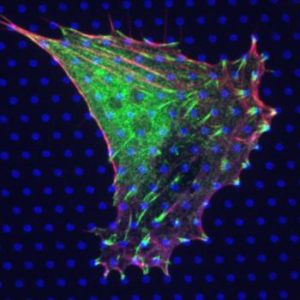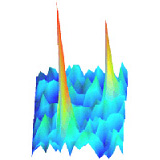
Many cellular reactions are controlled or mediated by mechanical forces. Cells probe the mechanical properties of their environment and subsequently transduce this information accurately into a specific molecular response: mechanical cues can determine the fate of stem cells, modulate the function of entire tissues and play a key role in various pathologies. Cells also alter their motility and metabolic functions depending on the mechanics of their surroundings. Strikingly, cells are not passive observers of the mechanical properties – many cells actively manipulate their surroundings either by the generation of new extracellular or pericellular materials or, even by exerting forces on the outside world.
Mechanical sensing and transduction pathways are fundamentally generic in the sense that the signal they convey is not generated, transported and interpreted in highly redundant and degenerate processes such as, for instance, in many biochemical sensory pathways or metabolic networks. Rather, similar physical mechanisms are at play in each mechanical signaling chain. A comprehensive and in-depth understanding of the processes involved will have immediate, and urgently needed, impact on the understanding of pathologies and malfunctioning of mechanical driven pathways. Our research program is aimed at understanding the role and interactions of the key proteins and processes, and as such has the potential to help identify novel molecular targets.
We study the detailed processes that results in actin rearrangements in stem cells by a combination of confocal fluorescence microscopy, speckle microscopy and atomic-force microscopy. The study is performed in a multidisciplinary team within a larger scientific program.
in collaboration with:
The Dutch Mechanobiology consortium

